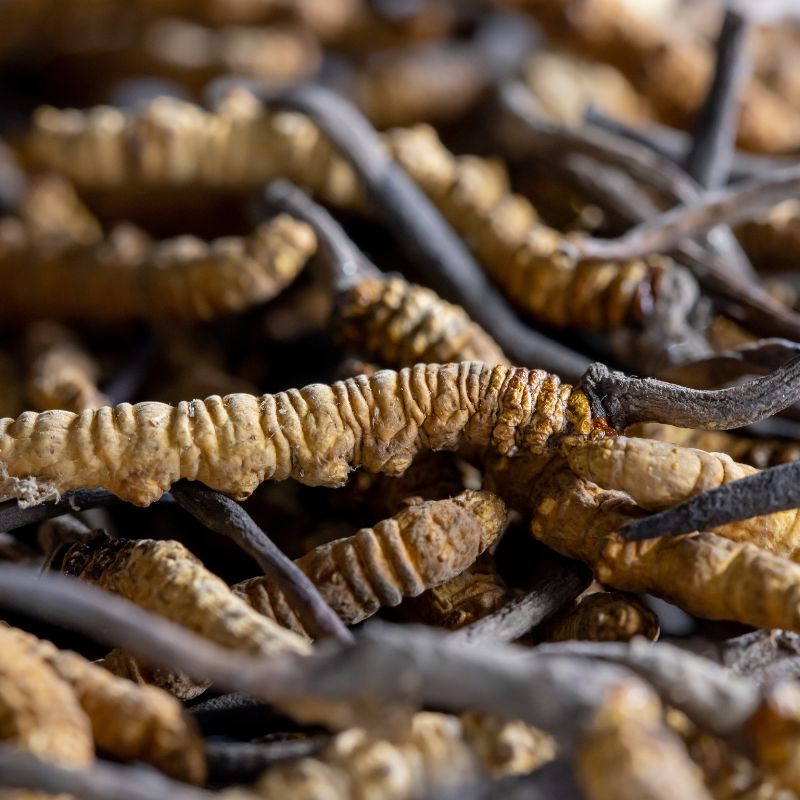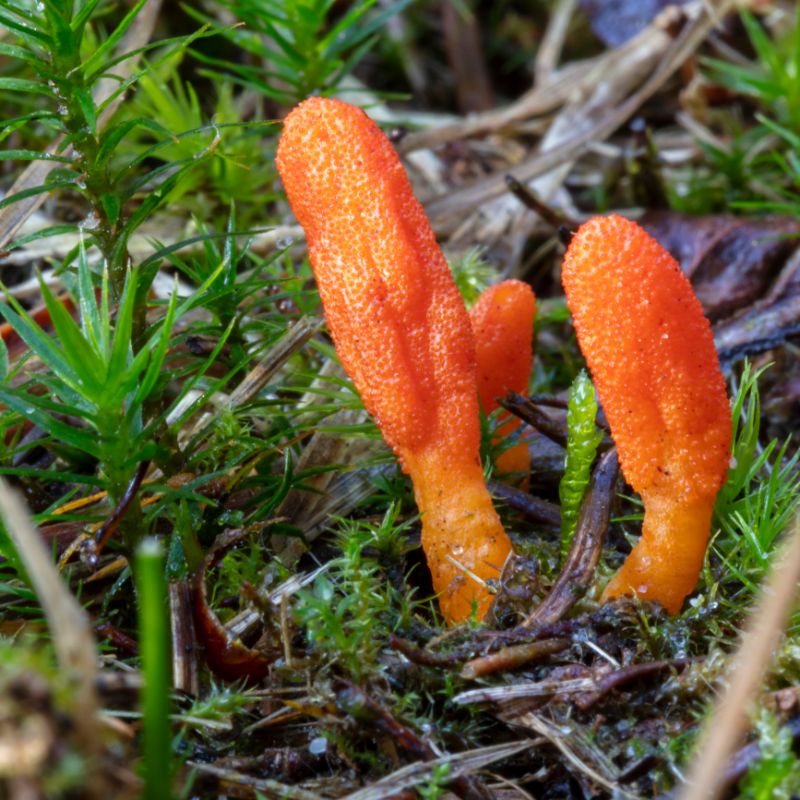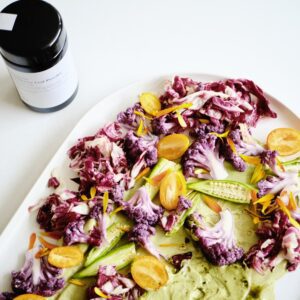
Mindful Herbal Practices for Balance, Rest, and Vitality – Before Biohacking was a thing
In our modern wellness landscape, “biohacking” often evokes images of

Kick-start, energise, rejuvenate
All carefully planned and prepared to help nourish, reset and rejuvenate the body and mind.

Cordyceps, a revered fungus in Traditional Chinese Medicine (TCM), has gained popularity for its wide range of potential health benefits. From boosting energy and athletic performance to supporting hormonal balance and immune function, Cordyceps offers valuable benefits for both men and women. In this article, we’ll explain everything you need to know about Cordyceps.
Cordyceps is a unique and fascinating kind of parasitic fungi, and have been revered for centuries in TCM for their potent health benefits. Often found in the high-altitude regions of Tibet, Nepal, and India, Cordyceps was traditionally harvested by hand, making them one of the most valuable natural remedies. Despite their beneficial properties, Cordyceps is parasitical by nature, meaning they target and attack specific insects – particularly caterpillars and eventually sprout long stems that grow outside of their host’s bodies.

The most well-known types of Cordyceps are Cordyceps Sinensis and Cordyceps Militaris. Cordyceps Sinensis, the more traditional and rare form, is highly prized for its use in increasing energy, stamina, and overall vitality. Being so rare and sought-after, raw Sinensis can cost several thousands of dollars! On the other hand, Cordyceps Militaris tends to be grown in a lab. Though it shares similar benefits to Sinensis, it’s more accessible and affordable.
Interested in Cordyceps Militaris? Shop our very own brand of Cordyceps Militaris Extract Powder.
Cordyceps has gained attention for its ability to enhance physical performance. According to a study published in Mycobiology Journal, Cordyceps Militaris has been shown to improve exercise capacity by increasing the production of adenosine triphosphate (ATP), the primary energy carrier in cells. This boost in ATP production helps muscles utilize oxygen more efficiently, leading to improved endurance and reduced fatigue during exercise.
Traditionally, Cordyceps has been considered a potent anti-ageing tonic. Its antioxidant properties help combat oxidative stress, which is a major contributor to ageing. By neutralising free radicals, Cordyceps may slow down the ageing process, promote skin health, and improve overall vitality.
Cordyceps has shown promise in helping manage Type 2 diabetes. According to Frontiers in Pharmacology, studies have indicated that Cordyceps Militaris can be used as a food supplement to relieve Type 2 diabetes. This is reportedly due to the presence of a compound called cordycepin, which has been shown to reduce blood glucose, reduce inflammation, and regulate the intestinal microflora. As such, regular consumption of Cordyceps may support better blood sugar control in individuals with diabetes.
Want some Cordyceps Sinensis? Take a look at our very own Cordyceps Sinensis Powder.
The potential heart health benefits of Cordyceps are significant. According to Health, it has been found to improve blood lipid (fat) levels and can also treat arrhythmia (fast, slow, or irregular heartbeat). Additionally, Cordyceps may improve blood flow by relaxing the blood vessels, which can help lower blood pressure and protect against cardiovascular issues.
Cordyceps is known for its strong anti-inflammatory properties. It contains bioactive compounds that can help reduce inflammation in the body, which is linked to a variety of chronic diseases. By modulating the body’s inflammatory response, Cordyceps may help alleviate symptoms of conditions such as arthritis, asthma, and other inflammatory disorders.
In Traditional Chinese Medicine, Cordyceps has been used as an aphrodisiac to boost strength and sexual performance. It’s believed to enhance libido, improve sexual function, and increase overall vitality. According to a study based on animal models published in the European Journal of Biomedical Research, Cordyceps has been linked to the production of Leydig cells, which are pivotal in the production of testosterone. Healthy testosterone levels are pivotal for sexual performance.
Cordyceps is also valued for its immune-boosting and anti-viral properties. It stimulates the production of natural killer cells, which play a crucial role in defending the body against infections and diseases. Additionally, Cordyceps has been found to exhibit antiviral activity against certain viruses, making it a potential natural remedy for enhancing immunity and combating viral infections.
Cordyceps is known for its potential health benefits for males, particularly in boosting testosterone levels. This can enhance libido, improve sexual function, and support overall vitality. Additionally, Cordyceps may significantly improve physical performance by increasing energy, endurance, and muscle strength, making it a popular supplement for athletes and active individuals. For prostate health, Cordyceps offers protective effects by reducing inflammation and supporting healthy prostate function.
Cordyceps offers several potential benefits for females, particularly in supporting hormonal balance and reproductive health. It may help regulate menstrual cycles and alleviate symptoms of menopause by balancing estrogen levels. Additionally, Cordyceps is known for boosting energy and enhancing mood, which can be particularly beneficial during hormonal fluctuations. On top of this, its properties help the body manage stress, promoting overall well-being.
Want to learn more? Check out this post on Cordyceps
While Cordyceps is generally considered safe for most people, some potential side effects and precautions should be noted. Mild side effects may include digestive issues like:
In terms of who should avoid using Cordyceps, there are a few to name:
Finally, interactions with medications are also a concern. Cordyceps may enhance the effects of blood thinners, increasing the risk of bleeding, and could interfere with immunosuppressant drugs.
It might also interact with other supplements, especially those that have immune-boosting or energy-enhancing effects. Therefore, it’s important to speak with a healthcare professional before combining Cordyceps with any medications or supplements. This ensures safe usage and avoids any potential negative interactions that could impact overall health.
Check out this podcast on Cordyceps!
When it comes to dosing Cordyceps, the recommended amount can vary depending on the specific form and intended use. For general health benefits, Dr. Axe recommends a daily dosage of 1,000 to 3,000 milligrams of Cordyceps extract. It’s typically consumed in capsule, powder, or tincture form.
As a general precaution, it’s important to start with a lower dose of Cordyceps to assess tolerance. From there, increase as needed. Finally, always follow the product’s instructions and consult with a healthcare provider for personalized dosage recommendations, especially if you have existing health conditions.
Reference:

In our modern wellness landscape, “biohacking” often evokes images of

If you’re looking for a natural way to support blood

Despite growing threats to our well-being, the human longing for
Copyright Shoku Iku © 2024 | All Rights Reserved.
The statements on this website have not been evaluated by the TGA or FDA. These products are not intended to diagnose, treat, cure or prevent any disease.
Sign up to receive your discount.